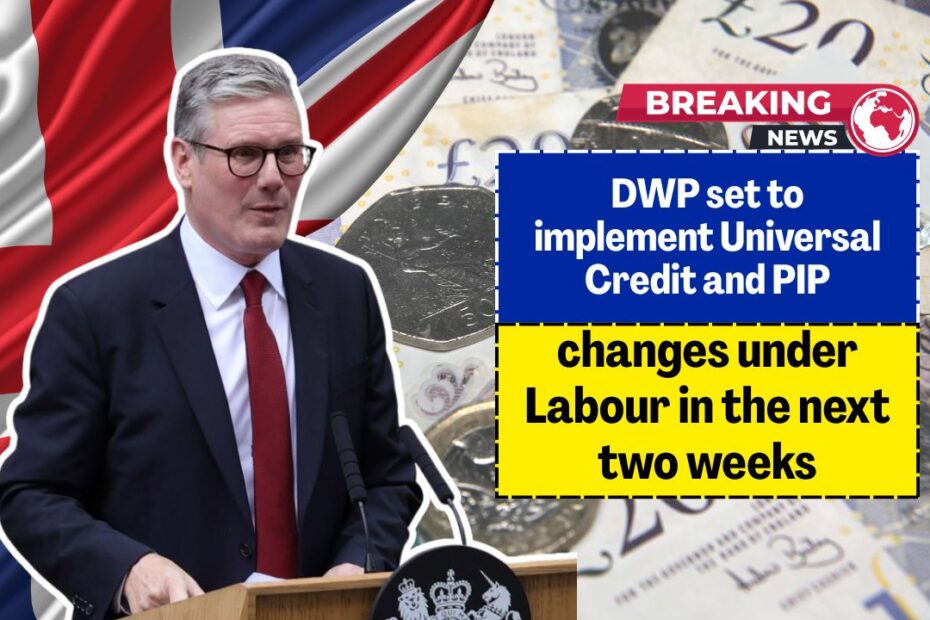The Department for Work and Pensions (DWP), acting under the Labour government, is set to introduce significant Universal Credit (UC) and Personal Independence Payment (PIP) reforms within the next two weeks.
These changes come after intense political pressure, internal rebellion, and advocacy from disability rights groups—and aim to strike a balance between fiscal responsibility and protecting vulnerable claimants.
What’s Changing and Why
Labour initially proposed sweeping changes to both UC and PIP, targeting approximately £5 billion in annual savings by 2030.
These reforms were part of the broader Pathways to Work green paper, aiming to reshape welfare support by 2030.l
Key Components of the Original Reform Package:
- Universal Credit: Raising the standard allowance, while reducing or freezing health-related premiums (i.e., the Limited Capability for Work‑Related Activity (LCWRA) element).
- PIP: Introducing a new “four-point” rule, requiring claimants to score at least 4 points in one daily living activity to qualify—tightening entitlement.
These proposed changes sparked widespread backlash from over 120 Labour MPs, disability charities, and advocacy groups who condemned them as draconian and potentially harmful when implemented broadly.
What Has Changed: The Two-Week Overhaul
In response to growing criticism, Labour’s DWP has started implementing a rapid response package within the next two weeks:
| Reform Area | Details |
|---|---|
| PIP Transitional Payment | A 13‑week continuation of PIP for claimants who lose eligibility under revised rules. |
| UC Health-Related Protection | Existing UC claimants keep their current health premiums; cuts no longer apply to them. |
| Savings Reduction | Original target of £5 billion/year savings reduced—initial estimates now suggest £2.5 billion. |
| Scope of Protection | Roughly 370,000 PIP users and 2.25 million UC claimants now safeguarded from cuts. |
Why This Matters
- Avoiding a Two‑Tier System: Critics warned the reforms risked creating inequality—current claimants would be protected while new applicants would suffer cuts. The roll‑out delays help avoid that immediate split.
- Backbench Rebellion and Political Risk: With more than 100 Labour MPs voicing opposition and an internal revolt brewing, the government moved quickly to avert a parliamentary crisis.
- Human Impact Concerns: Reports suggest that proposed changes—if fully implemented—could push up to 150,000 more people into poverty, and cost mental health–affected claimants up to £5,750/year.
Additional Context: The Political & Budgetary Backdrop
- Spring 2025 Budget Pressures: In March, Chancellor Rachel Reeves announced welfare cuts to fund defence and higher spending. The proposed £5.5 billion in benefit savings came under scrutiny.
- Legislative Progress: The Universal Credit & PIP Bill was introduced on 18 June 2025 and intended to pass through Parliament swiftly. But significant amendments, including pausing PIP clause changes pending review, were made before the third reading.
- Liz Kendall’s Role: As Secretary of State for Work and Pensions, Kendall led the reform charge—emphasizing a shift from welfare to employment—while also navigating the internal resistance within Labour.
Summary of Current Measures
| Area | Original Proposal | Revised over Next Two Weeks |
|---|---|---|
| PIP Eligibility | Four-point rule for all claimants | Transitional 13-week support only; review delayed |
| UC Health Element | Frozen or reduced across the board | Protected for existing claimants |
| Annual Saving Target | £5 billion by 2030 | Revised to ~£2.5 billion |
| Claimants Affected | Up to 1–1.2 million losing PIP or UC extras | ~370,000 (PIP) and 2.25 million (UC health element) now protected |
In a swift course correction, the Labour-led DWP has committed to implementing critical changes to Universal Credit and PIP within the next two weeks.
The reforms include a 13-week transitional payment for PIP claimants facing reassessment, protection for existing UC claimants’ health-related elements, and a scaled-back saving target.
These moves were prompted by internal Labour dissent, powerful advocacy campaigns, and social equity concerns.
While this interim package brings short-term relief and political cover, the underlying issues—tight eligibility rules and structural reforms—remain subject to further debate and legislative scrutiny.
Claimants and observers should stay vigilant as the reforms progress toward full implementation.
Frequently Asked Questions
Who qualifies for the 13-week PIP transitional payment?
Claimants losing their PIP entitlement due to new assessment rules will receive continued full payments for 13 weeks as a buffer before reassessment takes effect.
Does the new Universal Credit health element apply to all claimants?
No. The freeze or protection applies only to existing claimants. New applicants from April 2026 onward may face reduced health-related premiums unless they meet severe conditions criteria.
How much have the welfare savings targets been scaled back?
Initial plans targeted £5 billion in savings by 2030. Following backlash, this has been reduced to about £2.5 billion, reflecting concessions made by the government.



